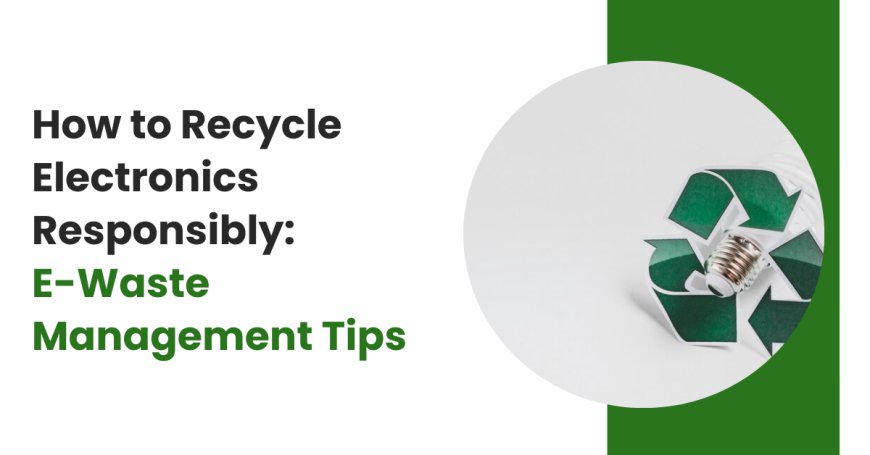How to Recycle Electronics Responsibly: E-Waste Management Tips

Managing electronic waste (e-waste) has become a pressing concern in today’s digital world. With the rapid advancement of technology, old and discarded electronics are piling up, posing environmental and health risks. Responsible recycling is essential to reduce e-waste and its harmful effects. This guide provides actionable tips on recycling electronics responsibly, while highlighting the importance of obtaining an EPR Certificate and EPR License for proper waste management.
Why Responsible E-Waste Management is Crucial
E-waste contains hazardous materials like lead, mercury, and cadmium, which can contaminate the environment when not handled properly. Recycling electronics responsibly not only prevents pollution but also conserves valuable resources like gold, silver, and copper.
Tips for Responsible Electronics Recycling
Follow these tips to ensure your e-waste is managed responsibly:
1. Donate or Sell Functional Electronics
Instead of discarding functional electronics, donate or sell them. Many organizations accept used electronics and refurbish them for reuse.
2. Use Authorized Recycling Centers
Ensure your e-waste is sent to authorized recycling centers or e-waste collection points. These facilities have the expertise and licenses, such as the EPR License, to manage electronic waste in an eco-friendly manner.
3. Check for Take-Back Programs
Many electronics manufacturers and retailers offer take-back programs where they accept old devices for recycling. Always confirm their compliance with EPR Certificate regulations to guarantee responsible disposal.
4. Avoid Dumping in Landfills
Dumping electronics in landfills releases toxic chemicals into the soil and water. Make it a priority to find alternative disposal methods that align with environmental standards.
5. Deactivate and Wipe Data
Before recycling or disposing of electronics, ensure that all personal data is wiped. This step is crucial for protecting your privacy.
The Role of EPR Certificate and EPR License in E-Waste Management
Extended Producer Responsibility (EPR) is a regulatory framework that holds producers accountable for the lifecycle of their products, including disposal.
-
EPR Certificate: This certificate is proof that a producer complies with e-waste management laws and has measures in place for safe recycling.
-
EPR License: A legal requirement for businesses handling electronics, this license ensures they follow government-mandated recycling protocols.
By partnering with certified recyclers and obtaining an EPR License, organizations can contribute significantly to responsible e-waste management.
Benefits of Responsible E-Waste Recycling
-
Environmental Protection: Prevents harmful chemicals from polluting the environment.
-
Resource Conservation: Recovers valuable materials for reuse in manufacturing.
-
Compliance with Laws: Aligns with government regulations, including those requiring an EPR Certificate.
-
Corporate Responsibility: Enhances a business's reputation by demonstrating commitment to sustainability.
Conclusion
Recycling electronics responsibly is not just an environmental necessity but also a legal and ethical responsibility. Whether you’re an individual disposing of a single gadget or a business managing large-scale e-waste, adhering to proper recycling practices is crucial. Always ensure compliance with frameworks like the EPR License and EPR Certificate to contribute to a cleaner, greener planet.
Take action today by adopting these tips and becoming a part of the solution to the growing e-waste problem!
